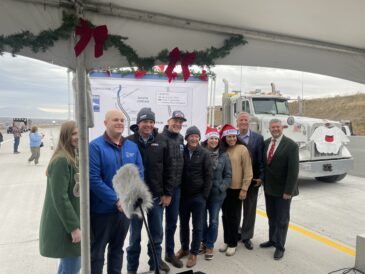Curtis defends clean energy tax credits his House GOP colleagues voted to remove

Alixel Cabrera, Utah News Dispatch
Sen. John Curtis, R-Utah, and John Zahurancik, president of Fluence in the Americas, after a tour of a Fluence Energy facility in Tooele.After Utah Republican Sen. John Curtis toured a battery module manufacturing facility located about 30 miles from the Salt Lake City airport, among open lands and farms in Tooele County, he reflected on an oil embargo in the ’70s that had deep impacts on the country’s economy.
Since then, he thinks of energy independence as a national security issue — one that may ultimately need the help of energy tax credits that his party is considering removing in the version of the “big, beautiful” bill the U.S. House passed last week.
“I have been an advocate that not necessarily that we should take it all at face value, but that we should carefully evaluate every one and make sure that it’s a good decision for our country, for our energy future,” Curtis said on Tuesday. “The House did pass a bill that dramatically curtailed those. My friends in the House kind of call me up and say, ‘listen, we’re counting on you to fix it.'”
The budget reconciliation package, as it’s currently written, proposes eliminating major programs from the Biden administration’s Inflation Reduction Act, a 2022 federal law that propelled clean energy investments, as President Donald Trump ordered his cabinet to fight state-led energy policies tied to climate change that “threaten American energy dominance.”
However, Curtis, who founded the Conservative Climate Caucus in the U.S. House and has said that people don’t have to give up their conservative credentials to be good at the climate change conversation, is planning on making the case to his Senate colleagues on how Inflation Reduction Act incentives affect all types of energy, including the country’s fossil fuel industry via carbon sequestration tax credits to help control greenhouse gas emissions.
“A lot of Republicans don’t like (the Inflation Reduction Act) because we weren’t included in it. We didn’t get a chance to vote for it,” Curtis said. “And one of my missions right now in Washington is to point out that there are a lot of Utah-slash-Republican-slash-conservative principles in that, that we want to make sure that we make good decisions on, and part of that is this energy independence that I want for our country.”
That, he says, includes the discussion of “be very careful with the decisions that we make and what we do, so we don’t do anything that messes with that energy independence that’s so important,” Curtis said in front of the staff of Fluence Energy, a Virginia energy storage production company with a Utah location.
During his short tour, Curtis saw automation systems and lots of employees working on the battery modules, which integrate systems to store energy at a utility scale.
The manufacturing operation opened at Tooele business park in 2022, John Zahurancik, president of Fluence in the Americas, said during the news conference on Tuesday, when pandemic-related challenges still plagued global shipping.
“We just couldn’t get these goods into the United States, the United States being one of the largest markets for battery, energy storage systems in the world,” Zahurancik said. “This is where storage originated. It’s where all the first projects were done. It’s where most of the largest projects in the world have been done.”
Utah stood out for its proximity to other clean energy facilities and for its great access to roads, he added. Since that start, the company has already gone through a few generations of production, with bigger and much heavier products, leading to a 2024 expansion bringing in a module manufacturing line.
As demand from the general public and large users, like data centers, keeps on growing alongside projections for massive rate increases, Zahurancik said his company has been looking to build new and reliable electricity generation.
“Batteries are right at the heart of that, both in terms of the affordability and the reliability,” he said.
Some Utah clean energy advocates also believe that the work being done at this facility is a big deal.
“It’s great to see a battery manufacturer like Fluence locate right here in Utah. Investing in a clean energy future and industries like energy storage is good for our state’s economy and meeting our energy needs,” Josh Craft, director of government relations and public affairs at Utah Clean Energy, said in a statement. “Like Senator Curtis said today, stable national investments in energy innovation are important to growing the industries of the future right here in our state.”
As for Curtis, he hopes that projects like this, and other emerging ones in the state, are able to lead the way in the country and the world. But, he suggested that state goals could be more ambitious.
“I was teasing in the other room, our governor wants to increase the amount of energy that we produce by double in the next 10 years. And if he were here, I’d put my arm around him and say, ‘governor, I love you. But that is not enough,'” Curtis said about Gov. Spencer Cox’s Operation Gigawatt. “There are demands coming on energy that far exceed doubling in 10 years.”
Utah News Dispatch is part of States Newsroom, the nation’s largest state-focused nonprofit news organization.



